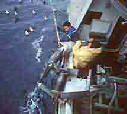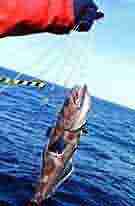|
EUROPEAN CETACEAN BYCATCH CAMPAIGN |
|
Eat No Sea Bass Campaign a Hit in Nation's Capital |
|
WASHINGTON, DC, May 8, 2002 (ENS) - Chilean sea bass is tender and delicious, a high value item on restaurant menus, but the fish is facing commercial extinction within the next five years unless pirate fishing is ended. |
|
Nearly 60 concerned restaurants and caterers in the District of Columbia, today became the latest group to take part in the Take a Pass on Chilean Sea Bass campaign. They have pledged not to serve Chilean sea bass until regulations are in place to ensure the long term sustainability of the species. |
|
At Galileo restaurant, a lunch hosted by Roberto Donna and Marco Nocco showcased seafood dishes served there as alternatives to Chilean sea bass. |
|
"We're keeping Chilean Sea Bass out of our kitchens to ensure |
|
The National Environmental Trust created the Take a Pass on Chilean Sea Bass to reduce demand for the fish, also known as the Patagonian toothfish. The campaign was launched in San Francisco in February, Chicago in March, and Philadelphia in April. Similar launches are scheduled to take place in New York and Los Angeles. |
|
"We are pleased that so many Greater Washington area chefs are joining this national campaign to help save Chilean sea bass from extinction," said National Environmental Trust president Philip Clapp. "We've gained the support of more than 500 chefs across the nation who want to join in the fight. Since we've seen such an overwhelming response from DC area chefs, we are hopeful that more local restaurants and those in other cities will quickly follow their lead." |
|
"Not serving Chilean sea bass is the right thing to do," said Todd Gray, chef and owner of Equinox Restaurant. "Our guests strongly support us because they agree that it's not worth sacrificing an entire species for our short term appetites." |
|
The Commission for the Conservation of Antarctic Marine Living Resources (CCAMLR), the international governmental body that regulates Chilean sea bass, estimates indicate that nearly 80 percent of fish sold on the world market is illegally obtained. |
|
On March 28, the U.S. National Oceanic and Atmospheric Administration and the U.S. State Department put poachers on notice that the United States is strictly enforcing import regulations and cooperating with the international community to prevent overfishing of the species. "Illegal poaching of Chilean sea bass threatens the Commission's conservation attempts," the agencies said. |
|
"The non-stop pace of illegal fishing virtually guarantees that the |
|
entire species will collapse in less than five years unless we take |
|
immediate action," said Beth Clark, a former Antarctic research |
|
scientist and a U.S. delegate to CCAMLR. "Last year alone, |
|
with regulations in place, nearly 40,000 tons of Chilean sea bass were illegally fished in the waters around Antarctica." |
|
Australian Minister for the Environment and Heritage, Dr. David Kemp, is considering a bid to protect Patagonian and Antarctic toothfish from illegal fishing through a listing under the international Convention for Trade in Endangered Species (CITES). |
|
Consultations with stakeholders including scientists, conservation groups, commercial fishers and others will begin immediately, Kemp said Tuesday. |
|
Kemp said there is concern that the scale of the illegal fishery could cause a collapse of the legal and regulated fishery within five years if it is not brought under greater control. |
|
Even if discussions with environmental groups, fishers, states and other countries point to support for a listing, there is no guarantee a push by Australia would be successful. |
|
"There is a strong possibility some member countries would object to a listing simply because it would be seen as a precedent," he said. "The issue is important enough, however, for us to give strong and urgent consideration as to whether we should proceed." |
|
A final decision on whether Australia will sponsor a bid for a CITES listing will be made in June. |
|
|
|
|
|
|

